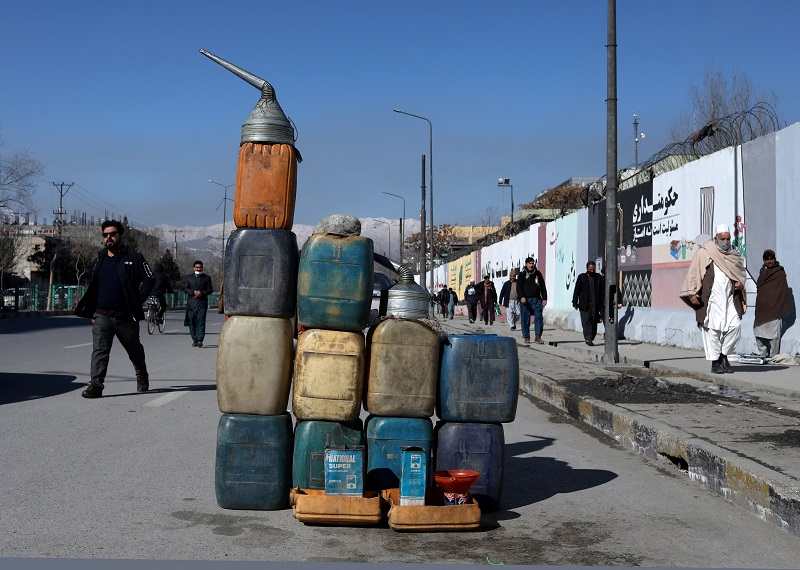
Cans containing gasoline are kept for sale on a road in Kabul, Afghanistan, January 27, 2022.
12:29 JST, August 30, 2022
KABUL (Reuters) – The Taliban administration is in the final stages of talks in Moscow over the terms of a contract for Afghanistan to purchase gasoline and benzene from Russia, Afghan officials told Reuters.
Habiburahman Habib, the spokesperson for Afghanistan’s Ministry of Economy confirmed that an official delegation chaired by the commerce ministry was in the Russian capital and finalizing contracts for supplies of wheat, gas and oil.
“They are in negotiation with the Russian side,” he said in a message to Reuters, adding they would share details once the contracts were complete.
A source from the office of the Minister of Commerce and Industry told Reuters technical officials from his ministry and the Ministry of Finance had stayed in Moscow to work on the contracts after a ministerial delegation visited this month.
“We are working on text of contract, (we have) almost agreed on gasoline and benzene,” said the official, adding they expected it to be finished soon.
Spokespeople at Russia’s foreign and energy ministries did not respond to requests for comment.
The contracts come after a Taliban delegation led by the acting commerce minister visited Russia in mid-August to hold talks on trade.
If completed, the contract would be a sign of foreign countries increasingly doing business with the Taliban, despite its administration not being officially recognized by any international government since it took control of the country after U.S. troops withdrew around a year ago.
It comes as the United States tries to convince other nations to cut down on use of Russian oil, saying the initiative is aimed at curbing the oil revenue that Moscow uses to finance its invasion of Ukraine.
Both Russia and Taliban-led Afghanistan face economic sanctions from international governments, including the United States.
No foreign government, including Moscow, formally recognizes the Taliban administration and Afghanistan’s banks have been hampered by the sanctions which have left most international banks unwilling to carry out transactions with Afghan banks.
The official source said they had a plan for how payments would be made but declined to provide details on whether official banking channels would be used.
Despite Afghanistan’s central bank assets being frozen, its banking sector hampered by sanctions, and a lack of formal recognition from abroad, some countries are doing business with Kabul, helping it access global markets amid a domestic economic crisis.
Pakistan is receiving thousands of tonnes of coal from Afghanistan a day, which the former has welcomed to ease its energy crisis. Transactions are carried out by private businesses in each country, and the Taliban administration collects millions of dollars in customs duties on the coal exports.
Top Articles in News Services
-

Survey Shows False Election Info Perceived as True
-

Hong Kong Ex-Publisher Jimmy Lai’s Sentence Raises International Outcry as China Defends It
-

Japan’s Nikkei Stock Average Touches 58,000 as Yen, Jgbs Rally on Election Fallout (UPDATE 1)
-

Japan’s Nikkei Stock Average Falls as US-Iran Tensions Unsettle Investors (UPDATE 1)
-

Trump Names Former Federal Reserve Governor Warsh as the Next Fed Chair, Replacing Powell
JN ACCESS RANKING
-

Producer Behind Pop Group XG Arrested for Cocaine Possession
-

Japan PM Takaichi’s Cabinet Resigns en Masse
-

Japan Institute to Use Domestic Commercial Optical Lattice Clock to Set Japan Standard Time
-

Man Infected with Measles Reportedly Dined at Restaurant in Tokyo Station
-

Israeli Ambassador to Japan Speaks about Japan’s Role in the Reconstruction of Gaza





















